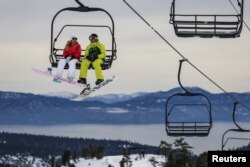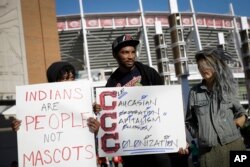Negro Ben Mountain. Jew Valley. Chinamans Hat. Redman Creek. These could be colorful, historic names of places around the United States… or they could be vestiges of a time when racial and ethnic slurs were a common part of American society.
In most countries around the world, you'll find majority culture awash with all kinds of names, some of them offensive for their local immigrant and minority groups. Unfortunately, many of them have found their way into print as place names.
The most common potentially insensitive place name in America is “squaw.” There are hundreds upon hundreds of Squaw Creeks, Flats, Buttes, Meadows and Springs. The 1960 Winter Olympics took place in California’s Squaw Valley. The first definition in many dictionaries of "squaw" is: a North American Indian woman or wife. But that's usually followed with a notation that the term is considered disparaging.
Mike Iyall, a Cowlitz tribal councilman and member of the Washington State Committee on Geographic Names, would like to see it removed from modern maps. "It's a generally offensive name for native people. To me, it's just not an appropriate name."
Lately, his committee and those in a number of other states are being asked to change demeaning names, choosing between their historical significance, and their potential to offend local citizens.
A half-dozen state legislatures from Maine to Oregon have passed laws to require or encourage the renaming of "squaw" places — or to phase out racially offensive names in general.
"It doesn't have to be that everyone is offended,” Iyall points out. “If it is known to be offensive to some, that should be reason enough to change it."
Three dozen offensive names
Washington State is the latest to get pro-active. Senator Pramila Jayapal convinced her state's Department of Natural Resources to inventory objectionable place names. The agency found 36 names and the senator's office published the list. It includes Jim Crow Point, Jim Crow Creek and Jim Crow Hill along the lower Columbia River. "Jim Crow" is shorthand for laws and measures that enforced racial segregation in the U.S.
At first, the locals did not appreciate big-city politicos telling them what's best, according to Joe Budnick of Cathlamet, the county seat.
"The inference was that we were racists and that we were stupid and didn't know we were offending people and all this other stuff, when we're not," he complained.
By Budnick's telling, Jim Crow Point and creek were named after an Indian chief. Another source says the name comes from crows that roosted in trees on the river bank. Yet others suspect the name was a demeaning reference to a 19th century African-American Navy deserter who settled in the area.
Whatever the true origin, Budnick took the initiative to suggest replacement names. The retired commercial fisherman and truck driver proposed renaming Jim Crow Point as Brookfield Point, in memory of the vanished cannery town that once thrived between the point and Jim Crow Creek, which he proposed to rename Harlows Creek. The hill would be renamed Beare Hill, in honor of another settler family. These were favorably received by the state geographic names committee.
Another targeted name is Squaw Bay in Washington's San Juan Islands. A number of islanders have spoken up or written letters in favor of a name change for the small cove. Others want to keep the name the way it is. A consistent thread through their comments is "don't succumb to political correctness" and "don't wipe away our history."
Jon Shannon, who lives on one of the islands, says he would never call someone a squaw. “But there is a difference between making it personal and the history that goes along with the place names that have been assigned historically. I guess I just don't see anything wrong with that."
A cumbersome process
In most states, the gatekeepers for geographic name changes are volunteer committees that may meet only twice a year. According to Mike Iyall, proposed new names still will need to originate at the local level. "We don't want to end up being the piñata in the middle," he said of the prospect of controversy and competing name proposals.
Kyle Blum of the Washington State Department of Natural Resources agreed. "Our traditional model has been to wait and respond to proposals when we get them. Our goal in working with Senator Jayapal and the initiative has been to actually go out and inform people. ‘Did you know this name exists in your area? Did you know there is a process by which it can change?’"
His agency is trying to line up public meetings in communities around the state to move the the cumbersome name change process along. The first one will be in King County, home to a Coon Creek. In that case and others, it's unclear if the name was given as a racial slur against a black settler or if it's a reference to raccoons. A Coon Creek or bay named after the ring-tailed animal might just keep its name.
Iyall said if it turns out upon further research that some of the questioned place names have inoffensive origins, they could still be clarified. "In the case of 'coon,' if it is the animal, then it should be 'raccoon,'" Iyall suggested. "If it's a family name [such as Redman], then perhaps the gentleman's first name could be attached as well. Then both become clear what we're talking about."
"I guess maybe somewhere down the road 200 years from now, somebody will go along and clean up our work too," Iyall concluded with a chuckle.







